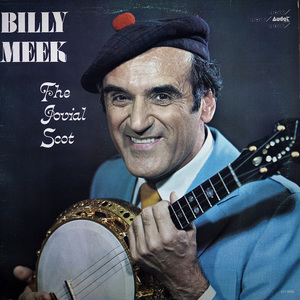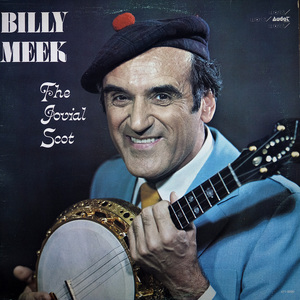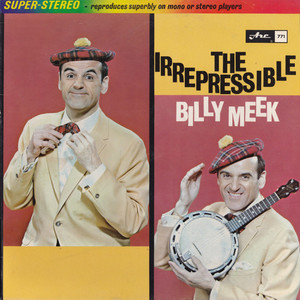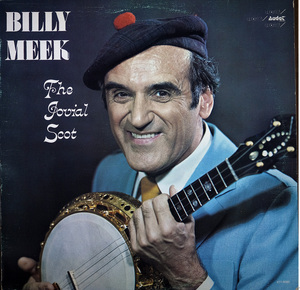Meek, Billy
Websites:
No
Origin:
Edinburgh, Scotland - Toronto, Ontario
Biography:
Born: 5 September, 1923, in Edinburgh, Scotland
Died: 11 June, 2010, in Toronto, Ontario, aged 86
Like a Boy Scout, Billy Meek, who died in Toronto on June 11 of cancer at the age of 86, was always prepared for the one inevitable question that every kilt-wearing Scotsman faces in his life: What is worn beneath the tartan? "It depends on the weather," was Meek's standard retort. The spicier one, usually accompanied by a grin and a wink, was, "There's nothing worn under the kilt. Everything is in perfect working order."
A crowd-pleasing journeyman comedian for most of his life, the irrepressible Meek milked everything Scottish for laughs - kilts, haggis, bagpipes, the Loch Ness Monster - all buttered with a working-class Edinburgh brogue that he had to work to maintain the longer he lived in Canada.
He was a master of the bygone art of gentle humour, with a story, some music and maybe a kilt-flapping jig thrown in. "He worked at a time when entertainers had to be multitalented," recalled Nancy Higgins, a long time friend who toured with Meek as an accordion player, who also sang and danced. "So he could sing a song, dance, play instruments, and tell a joke. Boy, could he tell a joke!"
It wasn't so much the jokes, good-naturedly dubbed by one critic as "the oldest, most cobweb-covered gags I've ever heard anyone get away with in public," as their timing. In one non-verbal bit, Meek would play a demanding Scottish tune on a set of miniature bagpipes. After the oohs and ahs and applause died down, he would turn, walk back a few feet, take the pipes off, and return to the microphone. Following a perfect pause, the obviously wired-up instrument would continue playing on its own. Crowds would roar.
He couldn't play a note on actual bagpipes but he did master the banjo, ukulele, soprano saxophone and miniature concertina. "All banjo players play The World is Waiting for the Sunrise," he would quip while cradling the instrument on stage. "But I'd like to play The Flight of the Bumblebee." (Pause for anticipation). "I'd like to, but I can't."
Meek's chief claim to fame was as a regular on the CTV show The Pig and Whistle, which ran from 1967 to 1977, making it one of Canada's longest running variety television programs. Meek was the "jolly kilted Scot" on the show, set in a friendly English pub, but filmed in Toronto. Aside from his usual musical and comedic offerings, he played the guy who was always scrounging for a free drink. The bit did little to dampen the stereotype of the stingy Scot, but audiences found it sweetly funny.
Also appealing were his earnest renditions of such classic Scottish songs as I Belong to Glasgow and Leaning on a Lamp Post. His best were recorded on two records, The Irrepressible Billy Meek and The Jovial Scot.
William George Meek was "born quite young," as he cracked, in Edinburgh on Sept. 5, 1923, into a show business family. By the time he was 14, young Billy was touring the music halls of Scotland and England with his father William and older sister Cathie as The Three Bright Sparks, doing two nightly shows of music and comedy and working with the biggest singer-comedians of the day, including Gracie Fields and George Formby. Billy's mother, Catherine, made the costumes and handled bookings. To evade child labour laws, Billy sported a fake mustache on stage.
His talents may have saved his life when war came. He was among some new recruits who were asked if anyone had an entertainment background for Ladies Night in the Sergeant's mess. Meek stepped forward and soon came to the attention of the storied Queen's Own Cameron Highlanders regiment, which needed musicians and comics to boost troop morale.
"The government decided Hitler wasn't scared of me," he told an interviewer once. "So I was put into the band." For the next four-and-a-half years, he played clarinet and cymbals in the regimental band, and was principal comedian in the Highlanders' travelling show in liberated Germany in 1945.
Sensing that the era of music halls was coming to an end in Great Britain, the family decided to join relatives in Toronto. The senior Meeks sold their grocery store, a much-needed sideline, and Billy cancelled a 20-week contract in Edinburgh. They arrived in a place with no music halls at all.
His parents adapted, establishing themselves as puppeteers, but "I dinna ken which way to turn," Meek lamented, and he took a job as a sales clerk at Eatons. To the rescue came CBC Radio's Opportunity Knocks, a national talent show he won in 1948 by singing I'm Looking Over a Four-Leaf Clover while playing ukulele. It wasn't especially original, but it was adjudged fresh and bright. The grand prize was a 13-week summer run as co-host of a radio show.
Bookings poured in: Toronto's Royal York and King Edward hotels, the Granite Club, and countless special events across southern Ontario and a few in the United States. In 1955, the federal government asked Meek to organize a variety show and take it to Japan and Korea to entertain English-speaking troops. He took along Canadian dance act Dennis and Maxine and comedian Norma Davis. The soldiers were a good crowd. "They were starving for laughter," Meek said years later.
He never looked back, and the work was steady for at least the next 30 years, with conventions, country fairs, appearances on The Tommy Hunter Show, and opening for acts like British singer Vera Lynn at Maple Leaf Gardens before 15,000 fans. His mother still handled bookings until her death.
Hunter recalled Meek as "a show stopper. Many of today's young performers could have learned a lot from the hard work he put into his craft."
As standup comedy generally coarsened, Meek stuck to a wholesome brand of humour that was never demeaning or profane.
One routine was to pluck children from the audience, bring them on stage, pull an oversized Tam o'Shanter beret over their heads, and join them on the concertina.
It was a surefire bit, though one time, an ill-tempered eight-year-old boy not only tore the cap off, but threatened to belt Meek. In its way, that too was funny.
"Billy on stage in the first two minutes: slow, modulated, smooth," enthused a magazine profile from the late 1970s, stuck into a bulging scrapbook of clippings. "After the first jokes go well, he allows himself a huge grin. He has a good body for this job, slender and agile. His hands are great. Long and equipped with prehensile fingers that, when he gesticulates or plays the banjo, seem to extend again for another length. He's a very dark Edinburgh man, with deep-set bouncing brown eyes. The grin is wide and spontaneous. On stage or in person, it's almost impossible not to respond to Billy's smile."
He returned to Scotland in 1977 for a visit, and rued the replacement of music halls with bingo parlours. Besides, he said, since everyone sounded like him, "I'd never be able to make a living here."
Meek never married or had children. His friends freely concede the cliché that he lived only to entertain, as he did too. "Entertaining's my job. That's when I'm happy. Aye, but it's a grand feeling."
-Ron Csillag, Special to The Globe and Mail, June 28, 2010
Born: 5 September, 1923, in Edinburgh.
Died: 11 June, 2010, in Toronto, aged 86.
Although Billy Meek was little-known in his native Scotland, he became a household name as a TV comedian and entertainer in his adopted Canada from the 1960s until his retirement.
For a decade, he was the much-loved, jovial kilted Scot at the bar on Canadian Television's series The Pig and Whistle, the nation's most popular entertainment show in the 1960s and 1970s. .
The show, which was a mix of music, dance and comedy set in a studio recreation of a typically-British pub, was hosted by a straw-hatted, red-waistcoated "pub landlord," the British actor and singer John Hewer, who was better-known in Britain as Captain Birdseye from the TV frozen food ads.
On the show, Meek performed with such guests as his compatriots Andy Stewart, Chic Murray, Jimmy Logan and the Alexander Brothers, as well as visitors including Barbara Windsor, Vera Lynn, Max Bygraves and Lonnie Donegan.
The audience sat at tables around the "pub" while Meek, in between songs he sang and played on his banjo, ukulele or concertina, stood at the bar unabashedly hoping to scrounge a drink.
Often wearing a tam o' shanter, he was the first to admit that he cashed in on the image of the cheery but tight Scotsman. He once said: "I'd never make a living back home. They a' talk jist like me."
Living in Canada for around 60 years, he had to work to maintain his Scottish accent, which was vital to his image. So were his songs: I belong to Glasgow (he neglected to tell the audience he was from Edinburgh), Sailin' up the Clyde, The Toorie on my Bonnet and so on.
On The Pig and Whistle, and in his appearances in theatres and clubs around Canada until he was into his 80s, he milked everything Scottish to get a laugh - haggis, Nessie, the bagpipes, the kilt.
"What's worn beneath my kilt? Nothing," he would say. "Everything's in perfect working order."
As he was the first to point out, such jokes were as old as the Grampians but to Canadians, many of them of Scots' origin, they went down well.
One of his favourite gags was to "play" a moving lament on a set of bagpipes, finish, bow to the applause and lay the pipes on a chair behind him.
Needless to say, the pipes then started playing the same lament on their own. He was, however, a fine banjo player, usually starting with another classic corny quip: "I'd like to play The Flight of the Bumblebee … I'd like to, but I can't."
William George Meek was "born quite young" - as he liked to say - in Edinburgh on 5 September 1923 and left school at the age of 14 to enter show business as part of a family act, featuring his grocer father, also called William, and sister Cathie, calling themselves The Three Bright Sparks and managed by his mother, Catherine.
He was called up on the outbreak of war, and his entertainment background brought him to the attention of the Queen's Own Cameron Highlanders, who were looking for artists to boost troops' morale.
"The government decided Hitler wasn't scared of me," he once said, "so I was put into the regimental band."
After the war, he continued with the regiment as an entertainer in liberated Germany before emigrating with his parents to Canada and settling in Toronto.
Meek first got a job as a sales clerk at the big Eaton's department store, where he took part as an entertainer in the annual Eaton's Santa Clause Parade, at the time the biggest Christmas parade in North America.
He was 25 when he won a radio talent show by singing I'm Looking Over a Four Leaf Clover to the backing of his ukulele and his radio career took off.
He was soon performing in hotels and clubs across Canada, and occasionally in the US, as well as entertaining Canadian and US troops in Korea and Japan.
It was in 1967 that he got his big breakthrough on The Pig and Whistle, where he performed until 1977.
"He's a very dark Edinburgh man, with deep-set bouncing brown eyes," one magazine reviewer wrote. "The grin is wide and spontaneous. On stage or in person, it's almost impossible not to respond to Billy's smile."
Even after his formal retirement, Meek continued to entertain, often in nursing homes or homes for war veterans. "Entertaining's my job," he said. "That's when I'm happy. Aye, and it's a grand feeling."
Billy Meek, who died of cancer in the Toronto Grace Salvation Army Hospital, never married.




